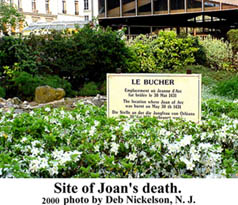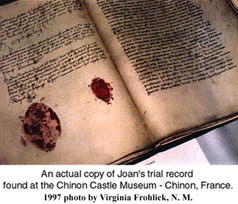
Jehanne la Pucelle
A mini-biography
(Joan the Maid, commonly called Joan of Arc in English)
Compiled from many sources by Steven R. Kanehl
Part 10
April 1431
Monday, the 2nd
– The judges and assessors decide to reduce the 70 articles of accusation down to12 articles.
Thursday, the 5th
– The 12 articles are agreed upon. The judges and assessors take the next several weeks to write their comments on them.Jehanne contracts food poisoning and is seriously ill with much vomiting. Cauchon sends a medical doctor to attend to her. After some discussion, it is decided to utilize the normal medical treatment of the time of bleeding. The doctor is cautioned to be careful, that Jehanne is crafty, and may try to take her life. The English are absolutely intent on having her survive the illness in order to publicly execute her. D’Estivet gets into a shouting match with Jehanne while the doctor is attending to her, accusing her of being a whore and intentionally eating food she knew would make her ill. Jehanne shouts back and her fever returns.
Wednesday, the 18th
– She is exhorted in her prison cell, as she lies seriously ill. They again offer her a counselor from among those participating in the trial. Jehanne believes she is in danger of dying. Jehanne asks to receive confession, the Eucharist, and to be buried in hallowed ground. If they do not, she entrusts her body to the Lord. Jehanne slowly recovers and her next trial session will be on May 2nd.
Wednesday, the 2nd
– Jehanne is publicly admonished in the room off the Hall of State. Jehanne tells them, "Read on, and then I will answer you. I look to God, my creator, in all. I love him with all my heart. They ask is that all she wishes to answer now. She responds, "I look to my judge – He is the King of Heaven and earth." The judges reply "do you mean you have no judge on this earth? Is not our holy father the Pope your judge?" Jehanne says, "I will not answer further on that. I have a good master – that is, our Lord – to whom only I look, and to none other." She tells Cauchon, "You will not do what you say against me without suffering for it both in body and soul."They read the 12 articles to her. She makes no reply and is returned to her cell.
Wednesday, the 9th
– Jehanne is lead to the torture chamber and shown the instruments of torture. (Torture was allowed in inquisition trials if it was believed the accused had made conflicting statements, or had lied against other evidence deemed indisputable.) Jehanne answered, "Truly if you were to tear me limb from limb and separate my soul from my body, I would not tell you anything more: and if I did say anything, I should afterwards declare that you had compelled me to say it by force." Then she said that on Holy Cross Day last she received comfort from the Archangel Gabriel: she firmly believes it was Gabriel, she knew by her voices it was he. She said she asked counsel of her voices whether she should submit to the Church since the clergy were pressing her hard to submit: her voices told her that if she desired Our Lord to aid her she must wait upon Him in all her doings. She said that Our Lord has always been the master of her doings, and the Enemy never had power over them. She asked her voices if she would be burned and they answered that she must wait upon God, and He would aid her. When asked about the crown she said she had given to the archbishop of Reims, and whether she would refer herself to him, she answered: "Send him here [and let me hear him speak]: and then I will answer you. He dare not deny what I have told you."But seeing the hardness of her heart and her manner of answering, we the said judges, fearing that the torments of torture would be of little profit to her, decided to postpone their application until we had received more complete advice on the question.
Saturday, the 12th
– The judges assemble and vote 11 to 3 to not torture Jehanne. Aubert Morel, Thomas de Courcelles and Nicolas Loiseleur were the 3 voting for the torture. (Loiseleur was the one that had earlier tried to trick Jehanne by going to her cell and posing as a friend).
Sunday, the 13th
– The Earl of Warwick holds a large banquet. Warwick tells Cauchon the trial has gone on too long. Afterwards, some of the dignitaries (not Cauchon, however) go to see Jehanne in her cell. Jean of Luxembourg (who had first held Jehanne prisoner) says, "Jehanne, I have come to pay a ransom for you provided that you are willing to promise that you will never take up arms against us again." Jehanne sees through this and says, "In God’s name, you are mocking me, for I know well that you have neither the power nor the will to do this." And they exchanged similar phrases several times, with Jehanne then saying, "I know well that these English will have me dead, because they think after my death they will win the kingdom of France. But were there a hundred thousand Godons (slang for English) more than there are at present, they will not have the kingdom." At these words, the Earl of Stafford is enraged, and pulls his dagger halfway out of his sheath to strike Jehanne dead, but Warwick prevents him.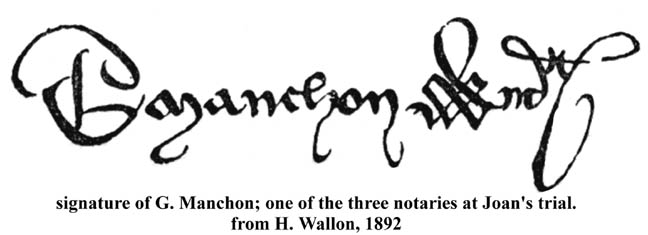
Wednesday, the 23rd
- Jehanne is again admonished. She replies, "If I were at the place of execution, and the faggots (large logs) catching (fire) and the executioner ready to build up the fire, and if I were in the fire, even so I would say nothing else, and I would maintain what I have said at this trial until death. I have nothing more to say."
Thursday, the 24th
– Jehanne is led to the walled cemetery adjoining the abbey of Saint-Ouen. As they go, Loiseleur tells her, "Jehanne, believe me, if you wish your life can be saved. Take this female dress and do all that will be asked of you; otherwise you are in danger of death. If you do what I tell you your life will be saved; you will gain more good and you will no evil, you will be remitted to the Church." Two stands had been erected; one for dignitaries, and the other for Jehanne, Massieu (her usher) and Guillaume Erard. An enormous crowd has gathered, seething with excitement. Erard rises to deliver a sermon and the crowd hushes to listen. Erard uses John 15:6 as the text for his sermon, "The branch cannot bear fruit of itself, except it abide in the vine." He says every Christian must abide in the true vine of the Church, planted by Christ. About halfway through, he cries out in a loud voice, "Ah, France, you have been much abused, and Charles, who calls himself your King and ruler, has endorsed the words and deeds of this useless, infamous and dishonored woman, like the heretic and schismatic that he is; and not he only, but all his clergy, by whom she has been examined and not rebuked" (referring to those at Poitiers). He repeated these words two or three times about the King, then shaking his finger at Jehanne says, "I am speaking to you, Jehanne, and telling you that your King is a heretic and schismatic." Jehanne can longer contain herself and interrupts him, "Do not speak of my king. I dare to say and to swear, on my life, that he is the most noble of all Christians, who best loves the faith and the Church, and is not as you say." Erard turns to Massieu standing nearby and motions to keep her quiet. The sermon is over. She is shown the judges, who had often required that she submit her words and deeds to the Church. Jehanne replies, "I will answer you. As for my submission to the Church, I have already given them my answer. Let all my words and deeds be sent to Rome, to our Holy Father the Pope, to whom, after God, I will refer myself. As to what I have said and done, I have done it through God. I charge no one, neither my King nor nay other; if there is any fault, it is mine alone."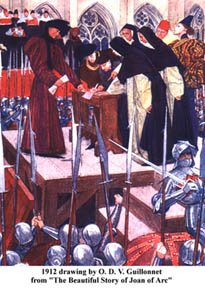
They tell her the Pope is too far away. Cauchon rises and begins to read the sentence. He is a good way through the sentence, reading, "for these reasons, we declare you excommunicate and heretical, and pronounce that you shall be abandoned to secular justice, as a limb of Satan severed from the Church …..". Jehanne has reached her human limits. Months of harsh isolated imprisonment, trickery, the words of the sentence, the sight of the executioner standing ready with his cart are all too much for her. Jehanne interrupts and says she will abide by whatever the church and judges would declare. She said that the apparitions and revelations could not be sustained and believed and she would not want to sustain them. Apparently Jean Massieu hands Jehanne a paper of abjuration already written out. Massieu urges Jehanne to sign the paper, warning her of the peril. Jehanne does not understand what it is on the paper. Jehanne asks that the clerks (to the trial) inspect it and give her counsel. Erard answers, "Do it now (meaning, "sign now"), otherwise you will end your days by fire." Jehanne signs by making a mark of a circle. Someone holds her hand and makes her draw a cross on the document. Jehanne smiles or laughs (the French word could mean either) after she draws the cross. The English are incensed. A great murmur among the crowd breaks out. Cauchon yells out, "You will have to pay for this. I have been insulted. I will not proceed until I have been satisfied." Stones are being thrown. Cauchon gets into an altercation with an English churchman, saying, "You are favoring Jehanne." Cauchon retorts, "You lie" and throws his papers to the ground in anger, saying he would go no future that day."
An English bishop says all this is trickery and that Jehanne is laughing at them. (Perhaps so, as I am sure that Jehanne remembered her letters to her troops in which, if she would sign with a cross, would indicate to do just the opposite of what the letter said, in case the letter fell into enemy hands. She had even said so at the trial, but in the confusion, perhaps the English forget this.)
Loiseleur says, "Jehanne, you have spent the day well, and please God, you have saved your soul." Jehanne asks, "Well, as to that, will some of your men of the church (arrange to) take me into your prison so that I be no longer in the hands of these Englishmen?" Cauchon answers, "Taker her back to where you found her" (the English secular prison).
Jehanne is sentenced to prison and to bread and water. Most say the sentence was a perpetual (life sentence), some say the sentence meant only a permanent prison building (as opposed to a temporary cell in the castle). Apparently heretics were known to receive three years of imprisonment, where upon they could be released. Jehanne is taken back to the cell, is given a woman’s dress to wear, and has her boyish haircut shaved, and put back in irons.
The English tell Cauchon, "The king has spent his money very badly on you." Warwick complains to Cauchon and the doctors, saying that it would go badly for the king (of England) because Jehanne would escape. One of them answers, "My Lord, do not worry, we will catch her again
What did Jehanne actually sign? Witnesses say it was only six to eight lines long and said that she would neither carry arms, nor wear men’s clothing, nor cut her hair short, and other things as well. However, the version that made its way into the official trial transcripts is 44 lines long in Latin (47 lines in French). Most believe the Cauchon substituted the much longer, and of course, much more damaging abjuration into the trial transcripts.
Sunday, the 27th
– Jehanne is now wearing men’s clothes again. Cauchon, Lemaitre and several judges rush to her cell to see her. From the journal:Jehanne was dressed in men’s clothes, that is a tunic, a cape, and a short robe and other men’s clothes, a costume that on our orders she had previously put aside and had taken on women’s clothes. And so we interrogated her, to learn when and for what reason she had once more assumed men’s clothes: "I did it on my own will" Jehanne declared; "I took it again because it was more lawful and convenient than to have women’s clothes, because I am with men; I began to wear them again because what was promised me was not observed, to wit that I should go to mass and receive the body of Christ and be freed from these irons. I would rather die than stay in these irons; but if it is permitted for me to go mass, and if I could be freed of these irons, and if I could be put in a decent prison and if I could have a woman (guard) to help me, I would be good and do what the church wishes." Cauchon asks, "Since Thursday, have you heard the voices of St. Catherine and St. Margaret" (the angels)? Jehanne, "Yes". Cauchon, "What have they told you?" Jehanne says, "What I said, I said for fear of the fire. God has expressed through St. Catherine and St. Margaret His great sorrow that I did a very wicked thing to which I consented in abjuring and making a revocation, and said that I was damning myself to save my life. If I should say that God had not sent, I should damn myself. It is true that God has sent me. I did not say or intend to deny my apparitions, that is, that they were St. Catherine and St. Margaret."
In the margin of the notes, the recorder writes, "A deadly reply."
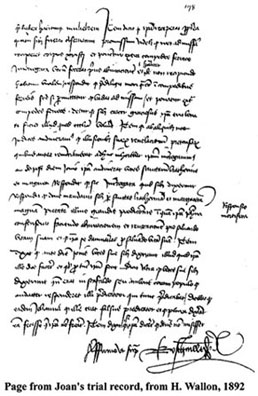
How did Jehanne get her men’s clothing back? Surely it was at the hands of the English, as a prisoner has no choice of clothing, except that the guards provide it. Two accounts differ. Martin Ladvenu says that Jehanne told her that an English lord entered her cell and tried to take (rape) her by force. It was for this reason that she resumed wearing men’s clothing. Jean Massieu says that Jehanne told him that on Sunday morning, the guards had removed her woman’s clothing, and thrown her the men’s clothing in a sack. She tells the guards the men’s clothing is forbidden her. She argued with them until noon, when, as she was naked, and finally having to go to the latrine room in her cell, put on the men’s clothing rather than remain naked. This second account makes more sense. Even if an Englishman attempted to rape her, she still would not have had her men’s clothing restored to her except that the guards provided or allowed it. Some say they left the men’s clothing in a sack within her easy reach as a constant temptation to her.
Cauchon and the judges leave. Cauchon cheerfully tells the English, "Farewell, make good cheer. It is done."
Tuesday, the 29th
– The judges meet. They first vote 39 to 3 that the abjuration should be read to Jehanne; the other three say to abandon her to secular justice with no further effort. This poses a problem for Cauchon, as the official trial abjuration is different from the one Jehanne signed on May 24th. In haste Cauchon flaunts the procedural rules of the inquisitorial trial. The judges are only advisory. Cauchon also fails to obtain the sentence of a secular court. Jehanne is sentenced as a relapsed heretic. Jehanne is to be abandoned to secular justice, with the request that they shall act merciful towards her. This is a mere formula, for the Church could not execute anyone. Yet all know that Jehanne would be burned by the secular government.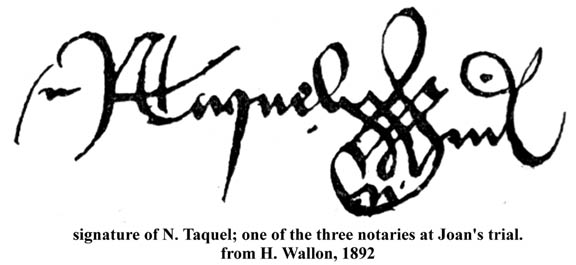
Wednesday, the 30th
– Ladvenu and Toutmouille arrive early in the morning to hear Jehanne’s confession. This is done charitably and with care. Massieu goes off to obtain Cauchon’s permission to administer the Sacraments. This takes a little time as Cauchon checks with some of the other doctors. The request is granted. Massieu is displeased by the lack of reverence in which the Sacraments are brought by a clerk. They send him back to get a candle and a stole. Jehanne receives Communion with a great devotion and many tears. Ladvenu tells her she will executed by burning at the stake. Jehanne breaks down and cries piteously and pulls at her hair, "Alas, that I should be treated so horribly and cruelly; that my whole body, never yet corrupted, should today be consumed and burnt to ashes! Ha! Ah! I would rather be heheaded seven times, than thus be burnt. Alas! If I had been in an ecclesiastical prison to which I submitted myself, and I had been guarded by men of the church, not my enemies and adversaries, it would not have turned out so miserably as it has. Ah! I protest before God, the Great Judge, the great wrongs and grievances that they have done me." She then makes marvelous complaint in that place of the oppression and violences that had been done to her in prison by the jailers and by others they had made enter against her. (Some interpret this and the events of the 27th to say that Jehanne was raped. Brother Pierre reported seeing her in tears and her face disfigured and outraged. I believe she was not raped, but was beaten, probably as they took the woman’s clothes off of her). Cauchon enters and Jehanne instantly says to him, "Bishop, I die through you." He protests, saying her death is on her own hands. Jehanne replies, "Alas! If you had put me in the prison of a church court and handed me over to the hands of competent and agreeable ecclesiastical caretakers, this would not have happened to me. That is why I complain of you before God." Brother Pierre Maurice enters and Jehanne turns to him for comfort, "Brother Pierre, where shall I be tonight?" And on his asking her if she did not trust in God, she replied that she did, and that, God willing, she would be in Paradise.Who could not forgive Jehanne this moment of human weakness, as she, all alone, a girl of nineteen years, faces a violent human death and eternity? Yet that day she would be in Paradise as the angels had promised her on March 1st. Her weakness is now passed. The remaining few minutes of her life would reveal her true godly character.
Jehanne is lead out of her cell, barefoot and in chains to the market place. The time is near 9 a.m. She is wearing a long white gown and a bonnet (adorned as the virgin bride of Christ as for her wedding, going to meet Jesus, her bridegroom, at the altar). The market place is packed with 10,000 people and perhaps up to 1,000 soldiers. Massieu and Ladvenu walk with her and Brother Pierre follows them. Three platforms are erected. One is for the judges, one for the priests, and one made of plaster contains a stake heaped round with wood. In front of this was a board painted with the words, "Jehanne who called herself la Pucelle, liar, pernicious, deceiver of the people, sorceress, superstitious blasphemer of God, presumptuous, disbeliever in the faith of Jesus Christ, boastful, idolatrous, cruel, dissolute, invoker of devils, apostate, schismatic and heretic."
She is led first to the priests and mounts their platform. Nicholas Midi preaches a sermon based upon I Corinthians 12:26 "And whether one member suffer, all the members suffer with it." The sermon (in my mind taken out of context) says basically that Jehanne has suffered to become a heretic, and therefore is attempting lead all church members to suffer into heresy. Jehanne listens very quietly as he ends the sermon with the words, "Jehanne, go in peace, the Church can no longer protect you, and delivers you into secular hands." At these words, Jehanne kneels down and prays to God, asking that all manner of people might show her mercy, whether of her own party, or of the other, and would pray for her, for she forgave them all the harm they had done to her. She continues praying for about 30 minutes, and even the judges and English are moved to tears. An English soldier makes a cross out of two sticks. Massieu hands it to her; she kisses it, and places it in her bosom. Cauchon stands and pronounces that Jehanne has been abandoned to secular justice. She is put in the hands of the bailiff. No secular sentence is ever read. An impatient Englishman cries out, "Priest, are you going to let us get done in time for dinner?" The bailiff makes a motion with his hand and tells the executioner "Away with her." The executioner seizes her and leads her to the stake. Jehanne contains praying and begs each priest there to say a mass for her. She is chained to the stake. A tall paper hat is set upon her head with the words "Heretic, relapsed, apostate, idolatress." Jehanne asks the priests, "I pray you, go the nearest church, and bring me the cross, and hold it up level with my eyes until I am dead. I would have the cross on which God hung be ever before my eyes while life lasts within me." Brother Pierre rushes to get a golden crucifix from the nearby church of Saint Sauveur. Some English laugh, as she calls in a loud voice upon St. Catherine, Saint Margaret and Saint Michael. She cries out, "Rouen, Rouen, shall you suffer for being the place of my death?" Brother Pierre climbs the platform holding the crucifix before Jehanne’s eyes. The fire is lit. Jehanne, although only minutes from her own death, still has the compassion and presence of mind, to tell Brother Pierre to get down from the platform, as the fire has already been started, but to continue to hold up the cross. He does so, and continues to hold the cross up level with her eyes while she disappears within the circle of crackling flames. The executioner, who normally might strangle or cut the throat of the victim to spare their final agony, is prevented from reaching Jehanne as the platform is too high and the flames have risen too quickly. Jehanne calls on the holy name of the Lord Jesus at least six times. She implores and invokes without ceasing the aid of the saints of Paradise. She calls for holy water. Finally in a strong, loud voice she calls out "Jesus!" loud enough for all 10,000 to hear her. She surrenders her spirit and her head falls forward.
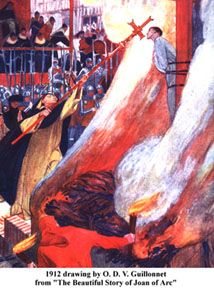
Jehanne la Pucelle, perhaps God’s most faithful servant since Bible days, the savior of France’s freedom, has now passed from this life into the eternity of Paradise. The virgin bride of Christ is now with her beloved Savior, Jesus Christ.
From the journal of the Bourgeois of Paris, a Burgundian. "She was soon dead and her clothes all burned. Then the fire was raked back and her naked body shown to all the people and all the secrets that could or should belong to a woman, to take away doubts from people’s minds. When they had stared long enough at her dead body bound to the stake, the executioner got a big fire going again round her poor carcass, which was soon burned, both flesh and bone reduced to ashes."
God has not let this moment pass without bearing His stamp. John Tressart, secretary to the King of England was heard to exclaim, "We are all lost; for it is a good and holy person that was burned." He said that he thought, "her soul was in the hands of God."
Thomas Marie reports that many tell him that they saw the name of "Jesus" leapt written across the flames. An English soldier, one that especially hated Jehanne, and said he would be first to add an extra log to the fire, sees a strange thing. He says that at the moment Jehanne gave up her spirit, he sees her spirit, as a white dove, leave her body, and fly off toward France. His friends try to console him with drinks at a local tavern, but that consolation fails. He finds an English monk and makes his confession, also in the presence of Brother Pierre. The executioner later arrives, looking for Ladvenu and Brother Pierre, very frightened and contrite, saying he was damned, having burnt a saint, and that God would never forgive him. He told them that in spite of all the oil, sulfur and fuel he had used, he could not reduce her entrails or her heart to ashes, at which he was astonished as if by a confirmed miracle. He is told to throw her ashes and remains in the nearby Seine.
AFTERMATH
June 1431
Jehanne is now dead. Cauchon, while successful in having Jehanne killed, was not successful in having her name disgraced and perhaps just as important, having Charles’ name disgraced by association.
Thursday the 7th
– A mysterious document is added to the trial transcripts. Cauchon and several top judges claim Jehanne makes certain confessions on the morning of her death when they go to visit her. None of the three trial clerks are there with them so they all (to their everlasting credit) refuse to sign the document. None of the other people with Jehanne that morning ever testified at any other time that they heard her say any of this (though most of the conspirators were dead by the trial of nullification, the priests in the cell with her were still alive, but did not testify to any of this). Most scholars dismiss this so-called confession. Surely Cauchon, if he went to see Jehanne to obtain a last minute confession, would have taken at least one of the trial clerks with him. Cauchon hopes to obtain by deceit at least something that discredits the voices, and then hopefully, to discredit the coronation of Charles as divinely ordained.The document says that Jehanne says the voices had deceived her, that she now believes they were evil spirits. She renounces her story about the angel bringing a crown to the king, saying she herself was the angel and the crown was only a promise of a future coronation.
What happened to those chiefly responsible for Jehanne’s death?
Historians find much interest in the demise of those three chiefly responsible for Jehanne’s death. Some wonder if this was God’s judgment on their lives. Jehanne had warned them, that if indeed they were her judges, to judge her rightly or that God may punish them for it.
Pierre Cauchon
– Cauchon died suddenly, without last rites of the church, while being bled by his barber-surgeon at his residence at Rouen on December 14, 1442. Soon thereafter, his entire family disassociated themselves with any of his life’s work and refused to comment at all at the nullification trial held some 13 years later.Jean D’Estivet
– One of Jehanne’s most rancorous judges; he insulted her in prison while recovering from food poisoning. He was found dead in a sewer outside a Rouen gate on October 20, 1438. The people of the day saw this as God’s retribution for his conduct during the trial.Nicolas Midi
– He was the author of the 12 articles of condemnation against Jehanne and preached the final sermon just before Jehanne’s execution. He contracted leprosy in 1434 and had to resign from all of his posts. He died circa 1442. Many people of his day interpreted his leprosy as a sign of divine punishment for his role in Jehanne’s trial.
The recapture of France from the English.
September 21, 1435
– A treaty is made in which the Burgundians align themselves with the French cause, rather than English. The treaty is finally ratified by both parties on December 10 effectively ending the civil war. Jehanne had earlier in her letters urged the Burgundians to make a good and lasting peace with the French.
April 17, 1436
– Constable Richemont leads French troops in the capture of Paris. Some English troops take refuge in a fortress, but are soon starved out and negotiate surrender. This was in accordance with a prophecy God has given Jehanne, that within seven years, the English would loose a prize even greater than Orleans, that of Paris.
November 12, 1437
– Charles VII enters Paris, but disappoints the local citizens by staying only three weeks.
1440
Charles, Duke of Orleans returns to France after 25 years in an English prison. This is in accordance with another prophecy God had given Jehanne.
November 10, 1449
– Rouen is captured by the French. This effectively ends the English occupation of France.
What happened to Jehanne’s family?
Late in 1431
– Jacques Darc dies, some say from sorrow of the death of his daughter Jehanne.
July 1440
– Jehanne’s mother, Isabelle Romee, is invited to move to Orleans. She is in great financial need. Her husband has been dead since 1431, her eldest son now also dead, as well as both of her daughters (Jehanne and Catherine), and much of the family funds were used to ransom Pierre from the English, taken prisoner the same day as Jehanne at Compiegne. She receives 48 sous per month as a living allowance, as well as free medical care from the town doctor. She is joined by her son Pierre, his wife and his son Jean. In 1443, the Duke of Orleans will grant them the island in the Loire outside of Orleans.November 28, 1458
– Isabelle Romee dies, probably in the little village of Sandillon.
Jehanne’s trial is nullified.
February 13, 1450
- Charles VII authorizes an inquiry into the legality of Jehanne’s trial (soon after Rouen was recaptured). Hearings are held that expose that the trial was prejudiced, but it is soon evident that only the church can officially overturn the verdict.
June 11, 1455
– Pope Calixtus III orders an investigation of the trial.
November 7, 1455
- At Notre Dame in Paris. Isabelle Romee (now about 68 years old), surrounded by her friends from Orleans, appears before a church tribunal to make her plea that the trial verdict that condemned her daughter, Jehanne, to death, be overturned.From that date until mid 1456 an extensive inquiry is undertaken. Testimony is sought in several cities, including Orleans and Domremy. Guillaume Manchon, the trial clerk for the original trial provides key testimony and trial documents (including his original French notes before the trial transcripts were translated into the official legal language of Latin). Much of what we now know of Jehanne’s life concerning her spirituality, her personal faith and devotion to God is brought out in this nullification trial from the scores of those who knew her best.
July 7, 1456
– The condemnation trial is nullified in a solemn ceremony in the Great Hall of the archiepiscopal palace of Rouen.Many similar ceremonies follow throughout France, including at one Orleans, with Isabelle Romee present.
Jehanne’s canonization by the Catholic Church.
1869
– A process begins to consider Jehanne for canonization.
April 18, 1909
– Jehanne is beatified by Pope Piux X.
May 16, 1920
– Jehanne is canonized by Pope Benedict XV.
